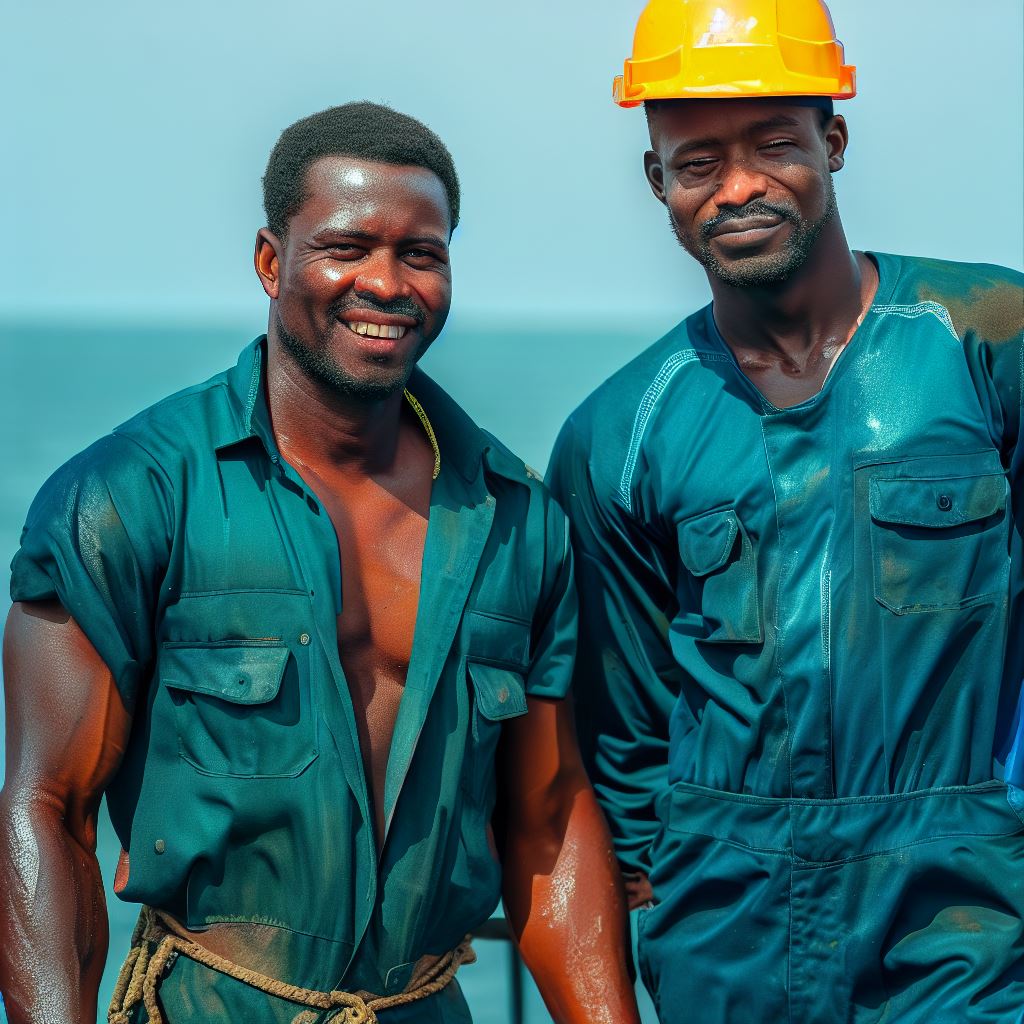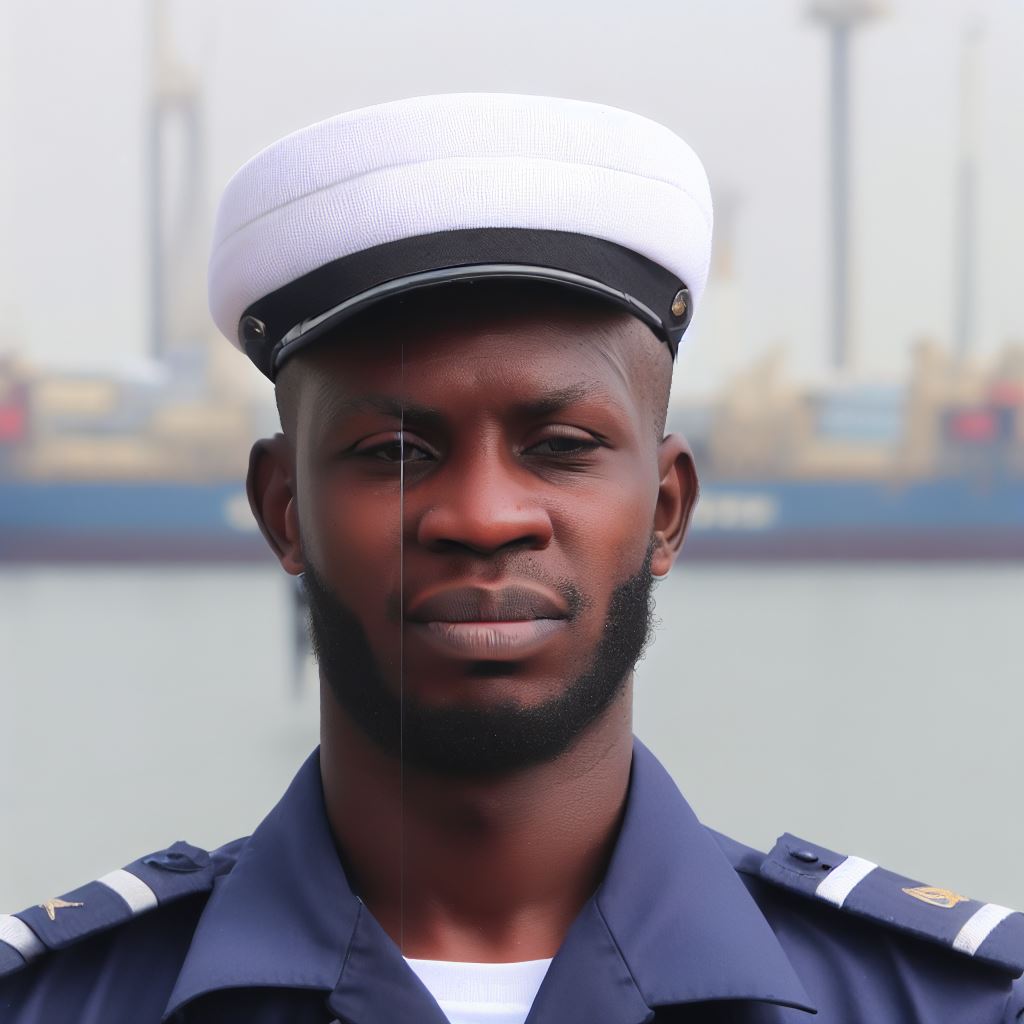Introduction
Working as a Marine Oiler in Nigeria holds great significance due to its contribution to the country’s maritime industry.
The marine oiler profession involves maintaining and operating machinery on ships, ensuring smooth sailing and efficient functioning.
This blog post aims to provide valuable tips and insights for individuals interested in working as a Marine Oiler in Nigeria.
Understanding the Role of a Marine Oiler
A. Definition and Responsibilities of a Marine Oiler
- A marine oiler is a vital member of a ship’s engine department responsible for lubricating and maintaining machinery.
- The primary duty of a marine oiler is to ensure smooth functioning of all mechanical equipment on board.
- They perform routine checks, monitor gauges, and report any abnormalities to the engineering officer.
- A marine oiler also assists in the general maintenance and repair of machinery and equipment.
- They are responsible for replenishing lubricants, cleaning filters, and performing basic troubleshooting tasks.
B. Importance of Marine Oilers in the Maritime Industry
- Marine oilers play a crucial role in the smooth operation of a vessel, ensuring its reliability and safety.
- They contribute to the overall efficiency of the ship’s engine department, reducing downtime and avoiding costly repairs.
- By maintaining proper lubrication, marine oilers help prevent excessive wear and tear on machinery.
- Their vigilance in monitoring equipment ensures early detection of potential problems, minimizing risks to the crew and cargo.
- Without marine oilers, ships would face a higher risk of breakdowns, delays, and even maritime accidents.
C. Skills and Qualifications Required for Becoming a Marine Oiler in Nigeria
- To become a marine oiler in Nigeria, one must have at least a secondary school education.
- Technical training or a degree in marine engineering or a related field is an added advantage.
- Physical fitness is crucial as the role may involve lifting heavy equipment and working in confined spaces.
- An understanding of engine systems, lubrication principles, and safety protocols is essential.
- Good communication skills and the ability to work in a team are highly valued in this profession.
In essence, a marine oiler in Nigeria holds a vital role in the maritime industry.
Their responsibilities include ensuring the proper lubrication and maintenance of machinery on board, contributing to the overall efficiency and safety of the vessel.
To become a marine oiler, one must possess certain skills and qualifications such as technical knowledge, physical fitness, and good communication abilities.
Therefore, aspiring marine oilers in Nigeria should focus on acquiring the necessary education and training to excel in this important role.
Read: The Role of Sailors in Nigeria’s Maritime Economy
Exploring Job Opportunities for Marine Oilers in Nigeria
A. Overview of the Nigerian maritime industry
- Nigeria has a thriving maritime industry that plays a significant role in the country’s economy.
- The industry includes various activities such as shipping, shipbuilding, port operations, and offshore oil exploration.
- It is a major hub for international trade, with many vessels passing through Nigerian waters.
- The Nigerian maritime industry provides numerous job opportunities for skilled professionals, including marine oilers.
B. Different sectors and companies that hire Marine Oilers in Nigeria
- The oil and gas sector in Nigeria is a crucial employer of marine oilers.
- Many multinational oil companies operate offshore platforms and require marine oilers to maintain machinery and equipment.
- Shipping companies also employ marine oilers for their vessels engaged in domestic and international trade.
- The Nigerian Navy and Coast Guard also hire marine oilers for their fleet maintenance and operations.
C. Current job market trends and prospects for Marine Oilers in the country
- The demand for marine oilers in Nigeria is expected to grow in the coming years due to the expanding maritime industry.
- With Nigeria’s strategic location along major shipping routes, there is a continuous need for skilled marine professionals.
- The offshore oil and gas industry offers lucrative opportunities for marine oilers, with competitive salaries and benefits.
- As the Nigerian government aims to develop the maritime sector, job prospects for marine oilers are expected to increase.
Overall, working as a marine oiler in Nigeria provides exciting prospects and job security.
The Nigerian maritime industry offers diverse opportunities in sectors such as oil and gas, shipping, and naval operations.
As the sector continues to grow, the demand for skilled marine professionals, including oilers, will remain high.
The offshore oil and gas industry, in particular, presents attractive remuneration and benefits.
With Nigeria’s strategic position in international trade, the country’s maritime industry is a promising field for career growth and professional development.
Read: Marine Oilers in Nigeria: Salary, Benefits, and Growth
Training and Certification Requirements
In order to work as a Marine Oiler in Nigeria, there are several mandatory certifications and licenses that you must obtain:
A. Mandatory certifications and licenses for Marine Oilers in Nigeria
- Marine Engineer Officer Class V Certificate of Competency – This certification is required for marine oilers to work on ships in Nigerian waters.
- Basic Safety Training – Marine oilers must complete basic safety training courses, including firefighting, personal survival techniques, and first aid.
- Medical Fitness Certificate – A valid medical fitness certificate is required to ensure that marine oilers are physically fit for the demanding nature of their work.
B. Accredited training institutions offering relevant courses and certifications
- Nigerian Maritime Administration and Safety Agency (NIMASA) – NIMASA offers certifications and courses for aspiring marine oilers, including the Marine Engineer Officer Class V Certificate of Competency.
- Nigerian Institute of Marine Engineering and Naval Architecture (NIMENA) – NIMENA provides training programs and certifications that are recognized by the Nigerian maritime industry.
- Maritime Academy of Nigeria (MAN) – MAN offers various courses and certifications related to marine engineering and oiling, providing the necessary skills and knowledge for a successful career.
C. Costs and time commitment associated with obtaining the necessary qualifications
Obtaining the necessary qualifications to work as a Marine Oiler in Nigeria can involve both financial and time commitments.
Here are some estimated costs and timeframes:
- Marine Engineer Officer Class V Certificate of Competency – The cost of this certification can range from ₦200,000 to ₦500,000 ($500 to $1,250), and it typically takes 6 to 12 months to complete the required training and examinations.
- Basic Safety Training – The cost for basic safety training courses is around ₦50,000 to ₦100,000 ($125 to $250), and the training usually takes 1 to 2 weeks to complete.
- Medical Fitness Certificate – The cost for a medical fitness certificate can vary depending on the medical facility, but it is typically around ₦5,000 to ₦10,000 ($13 to $25), and the examination can be completed within a day.
It is important to note that these costs and timeframes are approximate and can vary based on factors such as location, training institution, and individual circumstances.
In review, working as a Marine Oiler in Nigeria requires obtaining certain certifications and licenses, such as the Marine Engineer Officer Class V Certificate of Competency, basic safety training, and a medical fitness certificate.
Accredited training institutions like NIMASA, NIMENA, and MAN offer the necessary courses and certifications.
However, it is essential to consider the costs and time commitments involved in obtaining these qualifications.
Read: Sailor Training Programs in Nigeria: A Comprehensive Guide
Tips for Finding Marine Oiler Jobs in Nigeria
A. Networking within the maritime industry
- Attend industry conferences, seminars, and trade shows to meet professionals and make connections.
- Join professional organizations and associations related to the maritime industry.
- Attend networking events specifically targeted towards marine oiler job seekers.
B. Utilizing online job platforms and websites
- Create profiles on popular job search websites, such as LinkedIn, Indeed, and Jobberman.
- Regularly search for marine oiler job openings on these platforms and apply directly.
- Set up job alerts to receive notifications when new marine oiler positions are posted.
C. Building a strong resume and cover letter tailored to the marine oiler position
- Highlight relevant skills, certifications, and experience related to marine oiler roles.
- Emphasize technical knowledge, problem-solving abilities, and attention to detail.
- Include any previous experience working with marine engines, pumps, and other equipment.
- Use action verbs and quantify achievements to make your resume stand out.
D. Leveraging the assistance of recruitment agencies or maritime unions
- Contact recruitment agencies specializing in maritime industry placements.
- Provide them with your resume and express your interest in marine oiler positions.
- Join maritime unions or associations that can assist in job placement and provide relevant resources.
- Stay active in the union or association to access networking and job opportunities.
By following these tips, you can increase your chances of finding marine oiler jobs in Nigeria.
Networking, utilizing online platforms, having a strong resume, and seeking assistance from recruitment agencies or maritime unions will pave the way for success.
Read: Top 10 Companies Hiring Logistics Managers in Nigeria

Challenges and Opportunities in the Marine Oiler Profession
A. Potential Difficulties Faced by Marine Oilers in Nigeria
- Language Barrier: Communicating with locals and colleagues may be challenging for non-native English speakers.
- Cultural Differences: Adapting to the local culture and customs can be a hurdle initially.
- Climate Conditions: Working in Nigeria’s hot and humid climate can be physically demanding.
- Poor Infrastructure: Limited resources and outdated equipment may pose challenges in performing job duties efficiently.
- Security Concerns: Marine oilers often work in remote and potentially risky areas, requiring vigilance and precautionary measures.
B. Importance of Adapting to the Local Work Environment and Regulations
- Compliance with Local Laws: Understanding and adhering to Nigerian maritime regulations ensures safety and avoids legal issues.
- Navigating Work Culture: Adapting to the Nigerian work environment fosters better relationships with colleagues and superiors.
- Local Knowledge: Being familiar with local practices helps marine oilers anticipate challenges and find effective solutions.
- Building Networks: Establishing connections with local professionals can provide insights and support in navigating the industry.
C. Growth Opportunities and Career Advancements in the Field
- Training and Certifications: Gaining additional certifications in relevant areas enhances professional skills and marketability.
- Specialization: Developing expertise in specific marine systems or technologies opens doors to higher-level positions.
- Experience and Performance: Consistently demonstrating competence and dedication can lead to promotions and increased responsibilities.
- Continuing Education: Staying updated with industry advancements through workshops, seminars, and courses boosts career prospects.
- Global Opportunities: Leveraging international connections and experience can lead to employment opportunities beyond Nigerian waters.
- Leadership Roles: Proactively taking on leadership responsibilities showcases potential and paves the way for career growth.
In a nutshell, working as a marine oiler in Nigeria presents its own set of challenges and opportunities.
Overcoming language barriers, adapting to cultural differences, and navigating local regulations are crucial for success in this profession.
By embracing the local work environment and constantly seeking growth opportunities, marine oilers can advance their careers and thrive in this field.
It is through dedication, continuous learning, and industry networking that marine oilers can overcome challenges and unlock their full potential in Nigeria’s marine industry.
Working Conditions and Lifestyle as a Marine Oiler in Nigeria
A. Typical Work Schedule and Rotation Offshore
- Marine oilers in Nigeria typically work on a rotational basis, spending a fixed period of time on board.
- The most common rotation schedule is six weeks of work followed by six weeks of rest.
- During their work period, oilers work for long hours, usually 12 hours a day, seven days a week.
- The demanding nature of the job requires oilers to be physically fit and mentally prepared for continuous work.
B. Living Arrangements and Facilities Provided by Employers
- Employers typically provide accommodation facilities for marine oilers while they are offshore.
- Living quarters on offshore rigs are known as ‘rig living quarters’ or ‘rig camps.’
- These living arrangements are usually shared, with oilers having a roommate or staying in dormitory-style accommodations.
- Basic amenities such as beds, lockers, and communal bathrooms are typically available in the living quarters.
- Employers also provide facilities for meals, including mess halls where all crew members can have their meals.
- The living conditions may vary depending on the employer, with some offering more comfortable facilities and recreational amenities.
C. Impacts on Personal Life and Relationships due to Long Periods Away from Home
- Working as a marine oiler offshore in Nigeria can have significant impacts on personal life and relationships.
- The long periods away from home can result in strained relationships with family, friends, and loved ones.
- Celebrations, milestones, and important events may be missed due to the work schedule.
- Oilers often have to cope with feelings of homesickness and isolation while away from their loved ones.
- Maintaining a work-life balance can be challenging due to the demands of the job, often resulting in limited personal time.
- Effective communication and support from family and friends are crucial in dealing with the emotional challenges of offshore work.
- Open and honest communication within relationships is vital to understanding and managing the impacts of the job on personal life.
- Employers should also support the mental well-being of their oilers through counseling services and opportunities for rest and relaxation.
- Some oilers find solace in engaging in hobbies or activities during their rest period to alleviate the effects of being away from home.
Overall, working as a marine oiler in Nigeria presents a unique set of working conditions and lifestyle challenges.
The demanding work schedule, shared living arrangements, and long periods away from home can have significant effects on personal life and relationships.
However, with proper support systems and effective communication, oilers can navigate these challenges and maintain a fulfilling career offshore.
Conclusion
A. Summarize key points discussed throughout the blog post
Throughout this blog post, we have highlighted several key points for those considering a career as a Marine Oiler in Nigeria.
We discussed the importance of obtaining the necessary certifications and training, as well as gaining practical experience through apprenticeship programs.
Additionally, we emphasized the significance of having a strong work ethic, adaptability, and a commitment to safety.
B. The importance of thorough preparation and commitment when pursuing a career as a Marine Oiler in Nigeria
It cannot be stressed enough how vital thorough preparation and commitment are when pursuing a career as a Marine Oiler in Nigeria.
This field demands individuals to have a deep understanding of the industry, possess the necessary skills and certifications, and be adaptable to the challenges of the job.
By investing time and effort into proper preparation, aspiring Marine Oilers can position themselves for success.
C. Encouragement for individuals interested in the industry to take the necessary steps to pursue their goals
If you are passionate about working in the maritime sector and specifically as a Marine Oiler in Nigeria, we encourage you to take the necessary steps to pursue your goals.
Research various training programs and apprenticeships, network with professionals in the industry, and continuously improve your skills.
With dedication and perseverance, you can embark on a rewarding and fulfilling career as a Marine Oiler in Nigeria.




